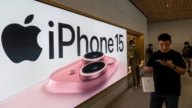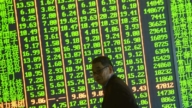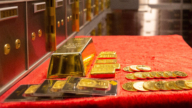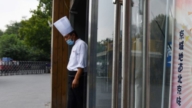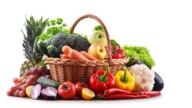【新唐人2014年04月12日訊】進入2014年以來,人民幣匯率連續三個月貶值。但是人民幣的連續貶值並沒有給中國的出口帶來利好,反而3月份進出口規模雙雙同比下滑。從整個第一季度來看,出口纍計下降了3.4%,這是從2010年以來的首次季度負增長。一種作為中國經濟龍頭的出口經濟出現負增長,中國經濟該如何應對呢?請看報導。
中共海關總署4月10號公布的資料顯示,中國3月份進出口總值3325億2000萬美元,同比下降9%。其中,出口下降6.6%﹔進口下降11.3%。
如果按人民幣計價,進出口、出口、進口同比分別下降11.5%、9.2%和13.8%。
2月份的海關統計資料,按美元計價出口下降18.1%﹔進口增長10.1%,進出口總額下降4.8%。
連續兩個月的負增長,使得一季度纍計出現了負增長。
大陸《國情內參》雜誌首席研究員鞏勝利認為,中國出口下滑一方面是受到了國外形勢的影響。他表示,由於美國退出寬鬆貨幣政策(QE),全球新興的24個國家都受到了影響,中國也不例外。
鞏勝利推測,中國經濟更嚴峻的應該是在第三季度,因為那時美國將終結QE。
鞏勝利表示,在中國國內從能源到交通等等費用也都在增加,經濟運行成本也是越來越高。
中國《國情內參》首席研究員鞏勝利:「因為中國現在有一點,中國政府的運行目前全球是之最的。就是包括政府的開支,政府的中間環節,還有政府對企業運行的費收之高,都是全球主要國家裏面最高的。」
鞏勝利指出,目前進出口都開始萎縮是必然的結果。如果中共政府不對經濟運行成本作出有效調整,往後中國的經濟還要嚴峻的多。
中國經濟學者段紹譯:「特別是中國的計劃生育搞了這麼多年,使很多的廉價勞動力越來越減少,勞動力的成本現在這幾年增長是非常大的,所以這些簡單的靠勞動力氣出口的企業確實失去了他們的競爭力。」
中國經濟學者段紹譯表示,中共政府干預進出口的政策誤導了市場,不能使有優勢的企業產品出口,也不能使其他國家有優勢的產品進口,破壞了正常的國際貿易模式。
英國「滙豐銀行」駐北京經濟學家馬曉萍,對美國《華爾街日報》表示:國內外需求持續疲弱,中國主要交易夥伴國經濟復甦程度不及預期。幾乎可以肯定,中國一季度經濟增速不及去年四季度。
而「蘇格蘭皇家銀行(RBS)」的首席中國經濟學家高路易(Louis Kuijs)在一份報告中指出:這樣的出口資料,會加大政策層和市場對經濟大幅放緩、中國失去競爭力的擔憂。
但高路易(Louis Kuijs)認為,可能中國的經濟沒有資料那麼糟,為讓更多的資金流入中國,一些企業虛報出口貨值。他測算,去年(2013年)3月份中國的出口同比增幅,被誇大了11.8個百分點。
其實,3月進出口資料一公布,中國股市立即下跌,「恆生中國企業指數」(Hang Seng China Enterprises Index)已下跌1.3%。
而中共政府也在4月初出臺了「微刺激」計劃,想通過減免小企業稅等措施,來推動經濟增長。
中共總理李克強日前也表示,中共政府將加快在鐵路和保障房建設方面的投資。
這都反映了當局對經濟的擔心。
段紹譯認為,政府主導的經濟模式應該叫停了:政府干預匯率,造成不應該出口的出口,不該進口的進口﹔而政府管制土地,則導致房子拆了建,建了拆,房價泡沫也越來越大。
段紹譯:「像一些不該出口的減少出口,該進口的增加進口,房子的泡沫早一點破滅。雖然早期雖然我們會看到經濟蕭條,我們會看到就業機會會減少,市場沒有那麼繁榮,但是長期來講是一個理性的回歸。」
段紹譯指出,中國目前這種發展模式,只會對中國國內的資源浪費越來越嚴重,對未來只有害處沒有好處,是到了調整的時候了。
採訪/易如 編輯/宋風 後製/孫寧
China Exports Fell And The Economy Weakened
Chinese RMB experienced a three month fall in 2014.
The devaluation of RMB brought contraction in both imports
and exports in March.
In the first quarter, Chinese exports fell by 3.4%, the first drop
since 2010.
How should China react to the falling exports, its economic leader?
The following is our report.
The Communist Customs data on April 10 showed that China’s
total import and export was US$ 332.5b, 9% down year-on-year;
that is a 6.6% drop in exports, and 11.3% fall in imports.
In RMB, that’s equivalent to 11.5% (import & export),
9.2 % (export) and 13.8 % (import) fall.
Customs February data showed exports fell by 18.1%;
imports increased by 10.1%,
total imports and exports decreased by 4.8 %.
The accumulative data gave a total negative growth for the first
quarter of 2014.
Chinese finance think-tank researcher Gong Shengli believes
that the decline in exports was affected by the global situation.
He said that 24 emerging countries, including China, are all
affected by the United States withdrawal from the monetary
policy, quantitative easing (QE).
Gong Shengli speculated that the Chinese economy should be
more severe in the third quarter when QE ends.
Gong Shengli indicates that costs have been increasing in mainland,
from energy, transportation, to operations.
Gong Shengli, Chinese finance think-tank researcher:
“In particular, the Communist government is running the highest
operating costs in the world.
From the expenditure of the government to the charges to
industry, the Communist regime is the highest."
Gong Shengli notes the import-export contraction in China is
inevitable.
If the regime fails to conduct effective adjustment of economic
operation costs, China’s economy will only get more severe.
Duan Shaoyi, economist: “Years of Chinese family planning
have largely reduced labor.
The cost of labor has taken big leap.
Industries relying on cheap labor have actually lost their
competitiveness."
Economist Duan Shaoyi explains that the regime policy in the
import and export field has misled the market, discouraged products
of advantage from either imports or exports, and totally
disobeyed the rules of international trade.
WSJ quoted Ma Xiaoping, a Beijing-based economist at HSBC,
“Internal and external demand remain weak", and that
the recovery of China’s major trade partners wasn’t as good as
expected.
“It is now all but certain that China’s growth in the first quarter
was slower than in the final quarter of last year", Ms. Ma added.
WSJ also reported, that “While the export data will add to
worries among policymakers and in the market about growth
slowing down precariously or China losing competitiveness,
we would caution against such interpretations", said RBS
economist Louis Kuijs in a report.
However, Louis Kuijs also noted, “Do not worry about the
export data". RBS estimates year-on-year export growth in
March 2013 was inflated by 11.8 percentage points due to
overinvoicing.
In fact, China’s stock market fell immediately upon the release
of the March customs data. Hang Seng China Enterprises Index
fell 1.3%.
The mini-stimulus plan introduced in early April was hoped
to push economic growth through tax relief for small businesses.
Chinese Premier Li Keqiang said the mini-stimulus was based
on higher spending on construction of railways, low-cost housing
and other projects.
This decision suggests the regime is concerned about the economy.
Duan Shaoyi believes that government-led economic model
should be terminated: the currency exchange rate intervention by
the regime has resulted in imports and exports that broke
the trade rules;
the land policy has resulted in numerous demolitions and
constructions which only created a bigger real estate bubble.
Duan Shaoyi: “Get the trade in a normal pattern will burst the
housing bubble quicker.
It will lead to recession, reduced employment, and a weak market,
but it will be a rational return in the long run."
Duan Shaoyi points out that the current development will only
result in more serious waste of resources, which is only
detrimental to the future.
It is time to adjust.
Interview/Yi Ru Edit/Song Feng Post-Production/Sun Ning




